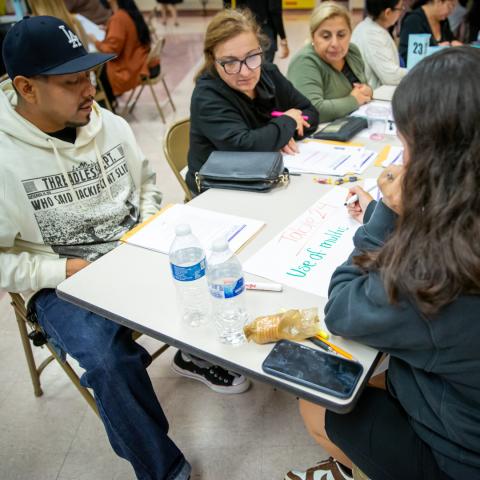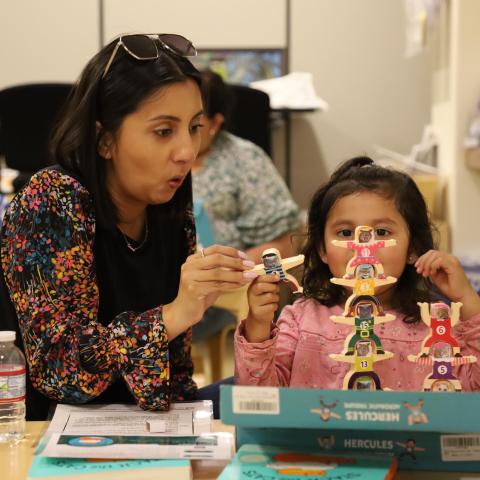Facilitator Resources
Building The Capacity Of Educators
Suites of resources on a range of early STEAM topics for facilitators and coaches to use in professional learning with educators.
This module focuses on developing a shared commitment to promote early STEAM. Building a system to support early STEAM within your agency takes ongoing collaboration across a group of individuals dedicated to promoting early STEAM. You might begin by building an early STEAM team.
Studies show that a team approach is an efficient and effective way to support positive change (Metz & Bartley, 2020). A team approach:
Consider these examples of agencies’ early STEAM teams. Each agency applied for and received funding to improve early STEAM outcomes in their communities. To achieve their goals, they focused on enhancing educators’ early STEAM mindsets, knowledge, and teaching practices.
School District
A superintendent of curriculum and instruction developed a vision and budget for promoting early STEAM. To collaborate on the vision, the superintendent brought together an early STEAM team including the following experts:
The individuals on this early STEAM team brought a range of experience and skills in administration, training, coaching, teaching, early math and science, and child development. They also represented the diverse racial, cultural, and linguistic backgrounds of the children served.
County Office of Education (COE)
A COE elementary math specialist partnered with the COE’s two early education directors to create a vision of providing early STEAM PL and coaching for a diverse group of educators—including family child care (FCC) providers, preschool and transitional kindergarten educators, and kindergarten to third grade and special education educators. They recognized that to reach all the county’s early educators and represent the diversity of educators and children served, they would need to increase the number of PL facilitators and coaches available. To do so, they expanded their team to include educators on special assignments from participating school districts. They also included an FCC provider and a few family members to share input as well.
Home-Based Learning Collaborative (HBLC)
HBLC is a nonprofit agency providing resources, referrals, and education to families and FCC providers in their local area. As part of their services, they run a Family Child Care Home Education Network (FCCHEN) program. The FCCHEN offers enrolled FCC providers ongoing PL, guidance, and technical assistance. HBLC’s FCCHEN program director and their team of bilingual FCCHEN early childhood education specialists developed a plan offering early STEAM PL and ongoing supports to Spanish-speaking FCC providers.
Your early STEAM team should include individuals with diverse backgrounds, professional experiences, and roles in your agency or community. Select each characteristic on the tabs to learn more.
Equitable early STEAM experiences are responsive to individual children’s lived experiences, cultures, languages, interests, strengths, and needs. To promote equitable early STEAM learning, early STEAM teams include individuals who have diverse racial, cultural, and linguistic backgrounds.
Effective early STEAM teams need individuals with a range of professional experience, skills, and expertise. For example, these individuals may bring early STEAM expertise, experience working with young children in different settings and with diverse abilities, experience coaching and training, administrative skills, or community knowledge.
Reflect:
Think about the people who work at your agency and the community your agency serves. Who might you invite to be a part of your early STEAM team?
Communication is key for collaboration. Discuss ways your team will share information and work together. As a team, make decisions about:
The ways that teams communicate and collaborate may change over time. Periodically, you might revisit how your team works together.

Guiding principles can bring people together, creating a common purpose and sense of unity. When we come together around guiding principles about STEAM, we can promote early STEAM for every child—of any background, race, culture, ethnicity, language, gender, ability, or socioeconomic status. Your agency may already have goals or principles related to STEAM. Your agency may also consider using the Count Play Explore (CPE) principles as a framework to develop a shared approach to promote early STEAM.
Math and science mindsets include how you feel about math and science and what you think about your math and science abilities and the abilities of others. Adults who have more positive feelings about math and science can help build children’s positive math and science mindsets.
Math and science are part of children’s everyday lives. Daily interactions and experiences provide multiple opportunities to explore math and science concepts and language.
Everyone—of any background, gender, race, ethnicity, culture, language, ability, and identity—can learn math and science. Math and science provide a framework for understanding the world around us and solving problems.
Play is an important part of children’s and adult’s lives. Playful learning involves hands-on, real-world experiences that are engaging, meaningful, and joyful for children and adults. Through playful learning experiences, children and adults can engage in math and science explorations and problem-solving while making connections between real-world experiences and math and science concepts.
Reflect:
How might your STEAM team use these math and science principles to develop a shared approach to promote early STEAM within your agency and community?

Modules for leaders, professional learning facilitators, and coaches to build their knowledge and skills in how to provide early STEAM professional learning.
Suites of resources on a range of early STEAM topics for facilitators and coaches to use in professional learning with educators.
Copy the link below to share this resource with students, families and colleagues, or to save for later.